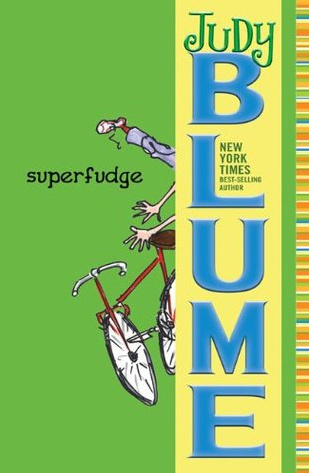

“I can't think when you're in here," he said.
"What do you have to think about?"
"Making!”
― Judy Blume, quote from Superfudge
“After drinking eight cups in a row, then walking home from school, then waiting for the elevator, then digging out my key and unlocking the door to our apartment, then dashing down the hall to the bathroom, I really had to pee. I mean, really. But Fudge was already in there, sitting on the toilet, turning the pages of Arthur the Anteater.”
― Judy Blume, quote from Superfudge
“On the last day of school we had a class party, with cupcakes and Island Punch. I drank eight cups of it. Island Punch is my favorite drink.”
― Judy Blume, quote from Superfudge
“Oh who owns the school? Oh who owns the school? Oh who owns the school? the people saaaayyyy. . . . Oh we own the school Oh we own the school ’Cause we are sixth graaaaders today!”
― Judy Blume, quote from Superfudge
“There’s a brown leather section, a green leather section, a red leather section and a tan leather section. Upstairs, there are four bedrooms, all in a row. And everywhere you look there are fireplaces. There’s one in every bedroom, there’s one in the living room, another in the dining room and still another in the library. There aren’t any in the bathrooms or the kitchen. My mother and father call the”
― Judy Blume, quote from Superfudge

“Uncle Feather came to town, Flying in the blue sky. Yellow nose and yellow legs And he belongs to me oh my . . .”
― Judy Blume, quote from Superfudge
“don’t you scrub up and have your dinner, and then you can decide where to go,” Mom said. I didn’t want to admit that I was hungry, but I was. And”
― Judy Blume, quote from Superfudge
“Before the end of the week, Fudge asked the big question. “How did the baby get inside you, Mommy?” So”
― Judy Blume, quote from Superfudge
“time. Every night I’d wake up to her howls. Turtle, who slept at the”
― Judy Blume, quote from Superfudge
“The dragon within my heart stirred, shifting her wings, as if remembering they could be used to fly.”
― Marie Brennan, quote from A Natural History of Dragons
“Her eyes meet mine and she smiles. And I swear it's like the whole goddamn sun is beaming right out of it.”
― Lynn Weingarten, quote from Suicide Notes from Beautiful Girls
“But guilt isn't smart. It isn't logical. It doesn't only live in the places it belongs.”
― Ally Carter, quote from See How They Run
“Good feelings are fragile, with me love doesn’t last. Love for a man doesn’t last, not even love for a child, it soon gets a hole in it. You look in the hole and you see the nebula of good intentions mixed up with the nebula of bad.”
― quote from The Story of the Lost Child
“Vazduh izmedju njih je bio fosforescentan.”
― Herbjørg Wassmo, quote from Dina's Book
BookQuoters is a community of passionate readers who enjoy sharing the most meaningful, memorable and interesting quotes from great books. As the world communicates more and more via texts, memes and sound bytes, short but profound quotes from books have become more relevant and important. For some of us a quote becomes a mantra, a goal or a philosophy by which we live. For all of us, quotes are a great way to remember a book and to carry with us the author’s best ideas.
We thoughtfully gather quotes from our favorite books, both classic and current, and choose the ones that are most thought-provoking. Each quote represents a book that is interesting, well written and has potential to enhance the reader’s life. We also accept submissions from our visitors and will select the quotes we feel are most appealing to the BookQuoters community.
Founded in 2023, BookQuoters has quickly become a large and vibrant community of people who share an affinity for books. Books are seen by some as a throwback to a previous world; conversely, gleaning the main ideas of a book via a quote or a quick summary is typical of the Information Age but is a habit disdained by some diehard readers. We feel that we have the best of both worlds at BookQuoters; we read books cover-to-cover but offer you some of the highlights. We hope you’ll join us.